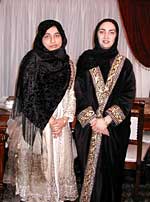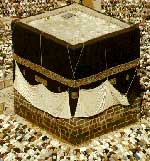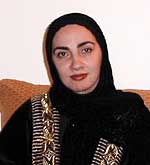By Laurel Druley
Minnesota Public Radio
February 7, 2002
|
| RealAudio |
About two million Muslims from around the world are making their way to Mecca. They will congregate in the holy city located in the Saudi Arabian desert to perform one of Islam's many important rituals, the Hajj. Some Rochester women are making the pilgrimage.
| |
|
|
|
||
Rana Mikati says the events of Sept. 11 will not stop people from making the pilgrimage.
"Whatever will happen, God will protect me. If something bad happens then this is my faith. Nothing will restrain people from going there," says Mikati, who lives in Rochester with her husband and three children.
She says pilgrims will be going there to pray for peace. Mikati says especially this year, peace will be on the minds of everyone in Mecca.
"Every year people pray for peace with themselves, peace with each other and peace on earth. I think especially this year, this kind of prayer will be more dominant than any other prayers," Mikati says. "Everybody is aware and concerned. Everybody does not like what's happening in the world."
Mikati's entire family travels to Mecca. The younger children will stay with a relative in Saudi Arabia, while Rana, her husband and their 12-year-old daughter will perform the pilgrimage rituals.
The Hajj is a week-long pilgrimage that begins in the 12th month of the Islamic lunar calendar. No matter where they live, Muslims always pray toward Mecca - the birthplace of the prophet Muhammad, who defined Islam.
| |
|
|
|
||
The Hajj is a milestone event in a Muslim's life. Rana Mikati says it's required for all Muslims who can afford it, to go on the Hajj at least once.
"Some people plan for years. It's not easy to be done - financially, emotionally and physically," says Mikati. "Even though we are with a million people, it's just like I'm all by myself with God."
Mikati says she isn't worried about terrorism. Mecca is considered sacred ground.
"It is a time for peace, even for radical people. During Hajj you cannot even pull grass from the earth. You cannot harm anything, even grass," Mikati says.
While in Mecca, the men wear white shrouds called aharam, and the women wear simple modest dress and head coverings. Amber Sabiha will travel to Mecca with her husband. She says there, everyone is stripped of class distinction and is equal in God's eyes.
"We feel like it's one big community - no difference of colors or backgrounds or financial status, everybody wearing same clothes - so we feel closer to everybody," says Sabiha.
| |
|
|
|
||
Upon arrival at Mecca, millions of people dress in white and swarm toward the Ka'bah shrine. The shrine is three stories high, a black cube-shaped structure often referred to as God's house. Pilgrims circle the Ka'bah seven times, imitating the Prophet Abraham. Sabiha says this ritual takes hours. She says, it's difficult to be patient with people who walk slowly. Elders are hoisted above the crowd on stilted wooden chairs.
After circling the Ka'bah, pilgrims hike the desert through Mina Valley, camping along the way. On the third day the pilgrims arrive at Arafat, a stretch of desert marked by a foothill. Sabiha says, it is here where pilgrims are deemed free of sin and given a fresh start.
The final day of the Hajj is celebrated all over the world. Eid ul-Adha is the second most important Islamic holiday next to the end of Ramadan. Muslims everywhere celebrate the occasion with a feast of lamb.
Rana Mikati says many in the U.S. have trouble understanding these Islamic traditions.
"You have to worship God like you're seeing him with you every second," Mikati says. "It's not like you go, you do your prayer before you sleep, and that's it. No. So it's a way of life."
Mikati says most people in the U.S. separate secular from sacred. Not Muslims. This week - no matter what the personal sacrafice - Mikati and millions of other Muslims will gather together for a once-in-a-lifetime experience, the Hajj.
More Information


